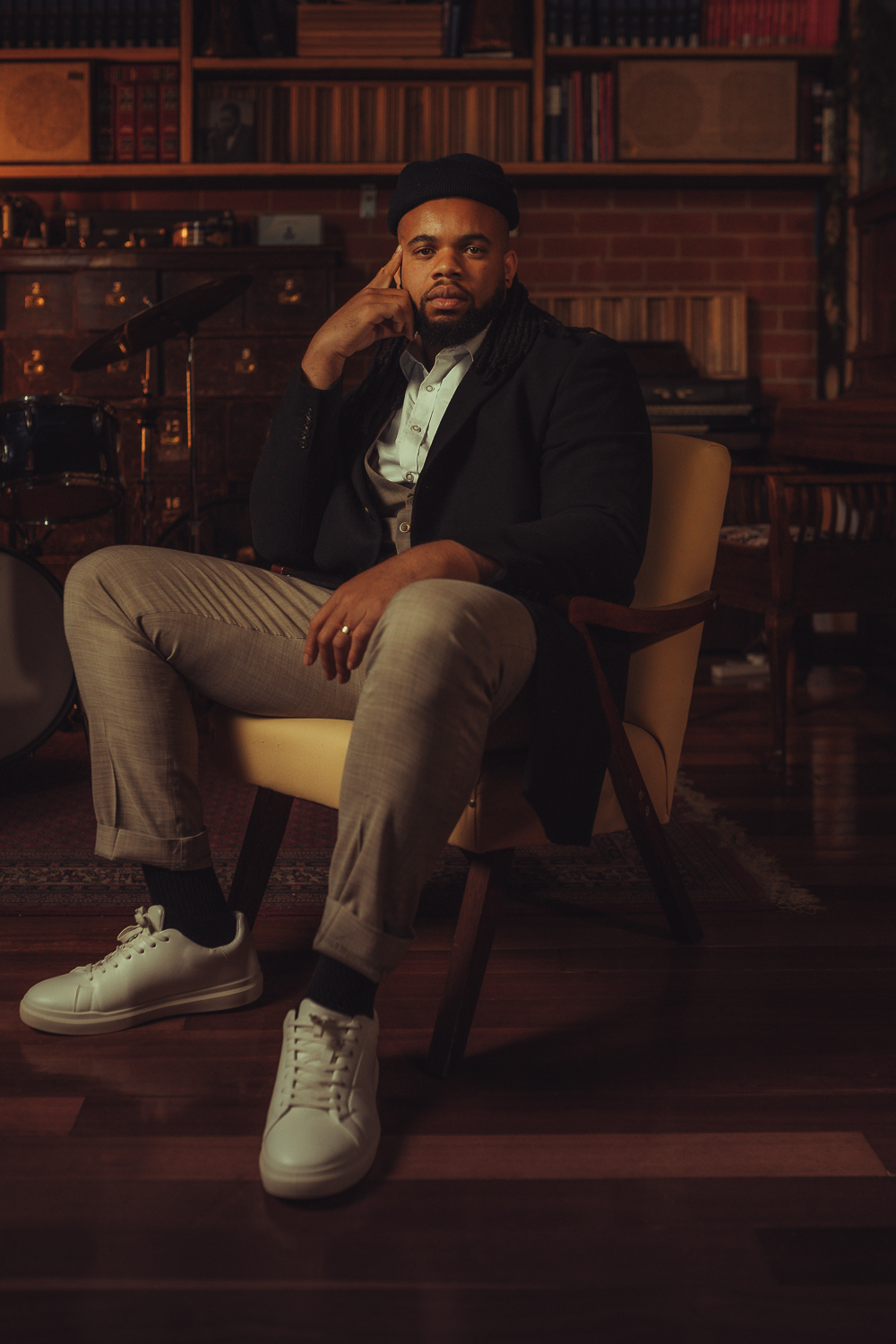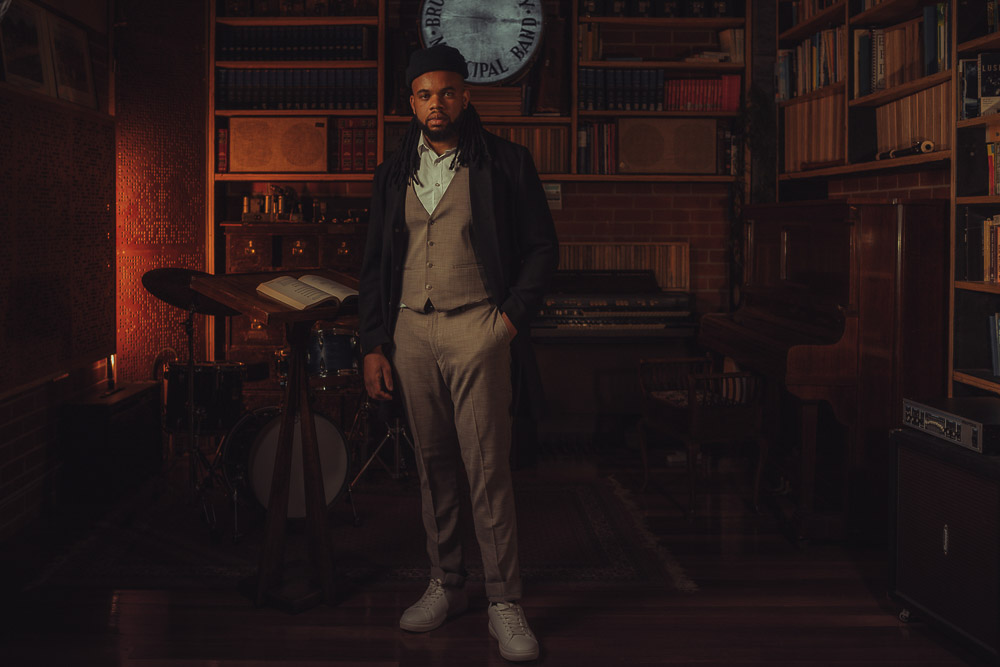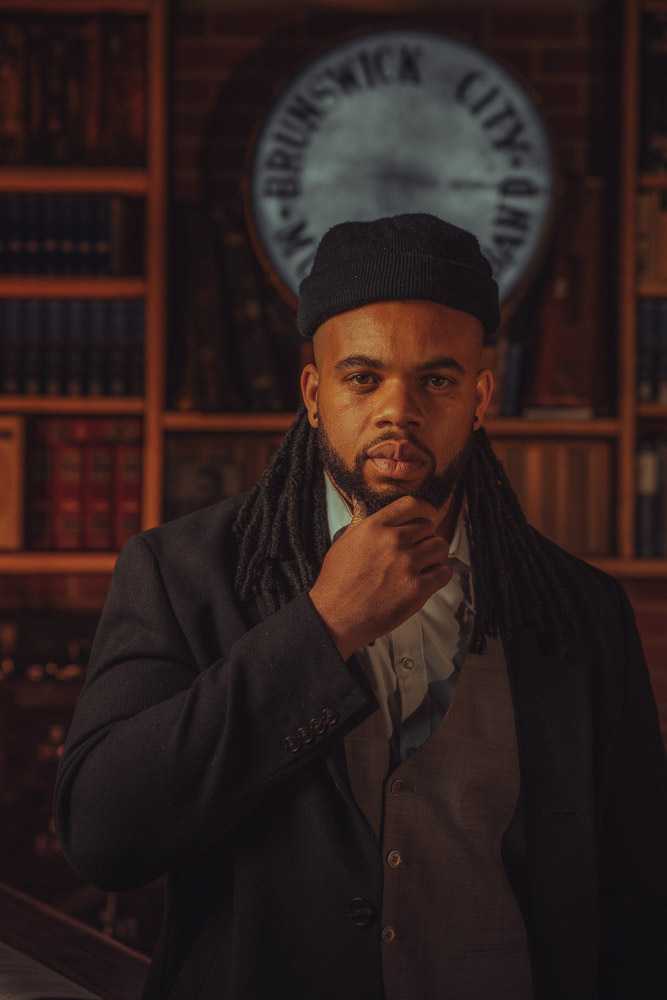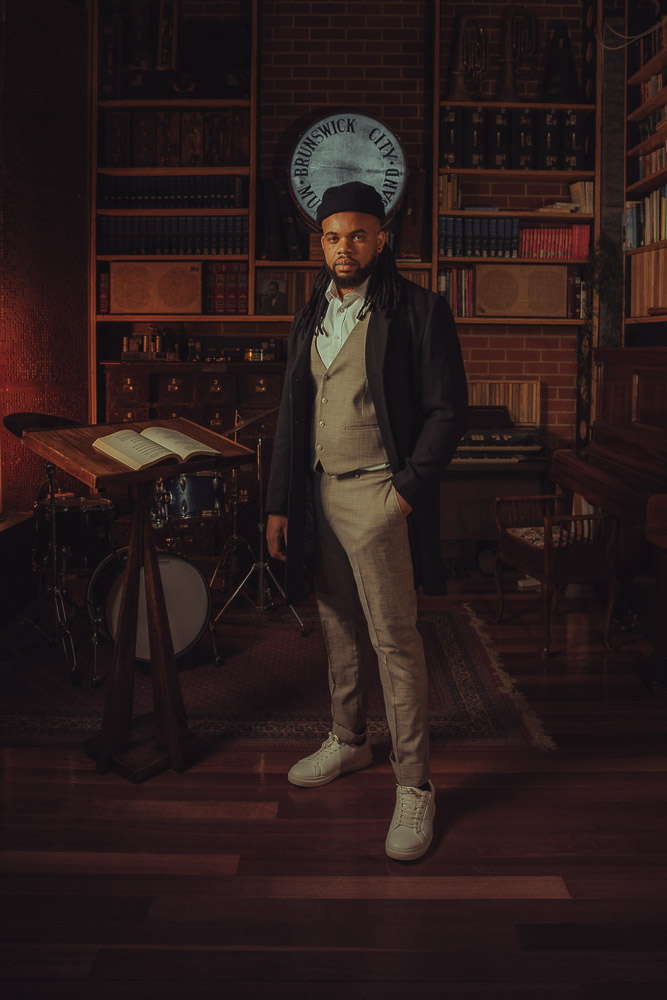
Creatives love to claim they’re too fluid & talented to be defined by a single term, ‘producer’, ‘rapper’, ‘activist’, ‘influencer’ etc. But Mazbou Q is one of the few people who actually transcend your understanding of a defined creative. Far more than all of those terms, Mazbou Q is truly an artist of our time who can do everything from teach to computer systems engineering?!



Tell us a bit about yourself, where you’re from, & your music?
I’m Mazbou Q – an artist, producer, content creator, and public educator with Igbo-Nigerian roots.
My music background’s a bit of a mix – classical music, heavy metal, and West African Highlife – and all of that feeds into the kind of Hip Hop I make. I’m always pushing the boundaries of the genre, aiming to create something that really connects with people who love musicality as much as I do. Historically I’ve drawn a lot of inspiration from legends like Fela Kuti, The Roots, and Black Star, and a lot of my music dives into socio-political topics and the layers of my cultural identity.
Social media knows me as ‘The Rap Scientist’, as I’ve developed a theory-based way of breaking down rap flow, which has picked up a bit of attention in both the music industry and academic spaces. I cover things like polymetricism, micro-timing, and displacement, and I’ve had the chance to guest lecture at places like Harvard, Berklee College of Music, LSU, and a bunch of other universities. It’s been awesome seeing how artists, musicians, and music nerds get excited about looking at Hip Hop through that kind of lens.
On the music production side, I run UNCHAINED XL Production Co. out of Auckland, where I work with both local and with international artists remotely, as well brands like MGM, ESPN, Footlocker, and Les Mills.
At the end of the day, whether it’s through my music, my educational content, or my production work, I’m all about challenging, inspiring, and connecting with people in meaningful ways.
Which music genres & artists have inspired you most?
Outside of Hip Hop, the genres that have influenced me the most are definitely different shades of progressive metal and afrofunk. On the metal side, bands like Dream Theater, A Perfect Circle, and Misery Signals really pushed me to think outside the box when it comes to rhythm and meter – something that shows up a lot in both my music and my teaching. On the afrofunk side, artists like Fela Kuti, Tony Allen, and The Funkees helped me tap into my Nigerian identity and showed me how music can be a powerful voice for justice and change.
You used to play in a heavy metal band, how has this effected your music & performance now?
Playing in a metal band taught me a lot about bringing raw energy and real crowd engagement to a live show. I came up through all-ages underground gigs where the mosh pits were wild (and sometimes a little violent), and it wasn’t unusual for people to jump on stage, grab the mic, and scream the lyrics with you. When I transitioned into Hip Hop, I knew I’d have to adjust my expectations a bit – but I still wanted to carry some of that spark over. And honestly, I think I have. It’s not just in the way I perform as a frontman, it’s baked into the music too. The live versions of my songs always feature live drums, heavy guitars, and other high-energy elements. A lot of people who see me perform end up saying it feels more like they’ve been to a rock show than a traditional Hip Hop gig.
When it comes to my recorded music, the metal influence is a bit more subtle – but if you know the genre well, you’ll hear it. The grooves, the energy, the punchiness – they’re basically metal imports hiding in plain sight.
What encouraged you to shift from heavy metal to hip hop?
My metal band came to a natural end at the start of 2014 and all the members went their separate ways. I still wanted to create and perform music, but I wanted another outlet that wouldn’t be so harsh on my voice. I’d always loved Hip hop, but up until that point I hadn’t given it a serious go – so I did.
How do lyricism & rhyme schemes compare from metal to hip hop?
It’s hard to make broad comparisons since both genres are super diverse, but based on the specific styles I’ve been into – like metalcore and hardcore on the metal side, and the more lyrically focused styles of Hip Hop I’m into now – there are definitely some differences. In terms of content, metal often felt more abstract and allegorical, leaving a lot up to interpretation. Hip Hop, on the other hand, tends to be more direct and concrete in its messaging. And when it comes to rhyme schemes, the kind of metal I was into didn’t really focus much on rhyme at all – whereas in Hip Hop, it’s foundational.
Thoughts on the Kendrick-Drake beef? Who won?
I thought it was dope – super exciting, entertaining, and honestly a breath of fresh air for Hip Hop as a culture. Super valuable too – I reckon the stories and archetypes presented by both artists can (and should) be deeply analysed in educational settings. But to me, Kendrick was the clear winner. Like, if we’re saying Drake won, then the whole idea of “winning a battle” kind of loses all meaning.
In your recent track “CRYPTOGRAPHY.” you blend a catchy chorus with deeply themed lyrics & some next level flows & pockets. How do you balance your priorities on a track & the various elements involved?
Funny enough, the track itself actually dropped back in September last year – it’s just the video that’s new. I’ve been working on attaching visuals to all the songs in my RAP SCIENCE series, which will eventually become a full album.
With CRYPTOGRAPHY., I was really trying to merge my music with my educational content. The goal was to pack in a bunch of complex rhythmic ideas that I could break down later on socials – so it wasn’t just a track, it was also teaching material. Because of that, I definitely leaned into the technical side, even if it made the track a bit less accessible on first listen – but that was intentional. I wanted to experiment with some wild flows over a familiar beat, and maybe inspire others to push boundaries in their own work too.
That said, this isn’t how I approach every track. Outside of a few songs on the RAP SCIENCE series, I usually prioritise message and musicality over technical showmanship.
Wtf is mixing & mastering?
At its core, I’d say mixing is the process of making all the recorded elements of a song sound the way they’re supposed to. I know that’s a bit vague, but that’s because a lot of the typical answers – like “making everything sound clear and clean” – miss an important part: creativity. Sometimes a sound should be a bit messy or distorted. Mixing is about figuring out how the artist imagined the song in their head, and then making that vision a reality.
Mastering, on the other hand, is a bit more objective. It’s about getting a track’s overall sound – things like loudness, balance, punch – to match the standard of other tracks in the genre. A good way to think about it is like editing a photo: you might tweak a landscape shot until it looks amazing on its own, but if that photo’s going into a magazine where every other image is super bright, saturated, and has a greenish tint, you’ll need to colour grade it so it fits. Otherwise, even if it looks great by itself, it’ll stick out in a bad way.
In March you released “POLYMERS.” with a super rad music video. What does this creative process look like, who did you work with, & where lies the creative balance between you as the artist & the filmer/editor?
Thank you! Same deal as with CRYPTOGRAPHY. – POLYMERS. actually dropped early last year (January), but the video came out in March. I worked with Tom Grut on it, and honestly, the process was pretty ad hoc. I had put together a document full of photos I found on Pinterest, matching the vibe of each song from the RAP SCIENCE project. Those photos became the visual inspiration for the videos.
For POLYMERS., the inspo was a bunch of black-and-white, asymmetrical frames of a person in different settings, always facing the camera. I thought it would make for a really cool – and more importantly, affordable – visual style for the video. I came up with the concept and handled the location scouting, and then Tom jumped in to help shoot and edit everything.
When it comes to my bigger, higher-production videos – like Go & Be Free, Now I’m Whole, and To The Gates – the process is a bit different. I’ll usually sit down with the director, explain the core themes of the song, and then trust them to come up with the visual ideas and really bring the story to life.
You’ve done some inspiring activism over the years, could you share this with us & do you have any advice for students wanting to make change in the world?
Back in June 2020 I was involved with organizing the first BLM solidarity protest in Tāmaki in June, as well as the End Sars protest in 2021. I’ve also been a big part of the public discourse around anti-Blackness in Aotearoa and in particular how it interfaces with the music industry, – mainly Hip hop.
For any young people wanting to make change, my biggest piece of advice is to prepare to make enemies. Learn to discern between those who are worth engaging with and those who aren’t. Also – don’t take it personally if and when your friends let you down. Advocacy isn’t everyone’s calling, and sometimes it takes a bit of pressure or conflict for people to realise that.
Your sound was quite different rapping as Unchained XL, what inspired this change?
As Unchained XL, my sound was heavily influenced by Fela Kuti and classic afrofunk – in a pretty direct and obvious way. I originally imagined my artistry as a fusion of that sound with Hip Hop, as a way of representing my dual identities. But by the end of 2019, I had a bit of a realisation: ironically, I’d kind of chained myself into a narrow creative lane. The persona I’d built was very militant and politically driven, which left little room to explore other parts of my humanity – things like personal vulnerability, love, grief, and everything in between.
I started to feel like I had more to say, but that the version of me I’d created couldn’t say it – so I knew it was time to evolve.
Thoughts on the criticisms some musicians have of music theory?
I think a lot of the criticism comes from a misunderstanding of what music theory actually is – and to be honest, that misunderstanding is partly the fault of the way music is taught. If you think of theory as this rigid set of rules handed down by long-dead European composers – rules that, if followed, only lead to boring, mechanical music – then I can’t knock you for rejecting it. That’s unfortunately how a lot of people first encounter it, especially in school.
But real music theory is just about thinking deeply and curiously about music.
It’s asking: Why does this sound good? What makes this interesting? What choices are being made here? And when you think about it like that, it becomes clear that everyone engages with music theory in some way – whether they realise it or not.
The key is learning to make theory work for you, rather than seeing it as something that boxes you in. That’s a big part of what I’m trying to do with Rap Science – to show that theory isn’t creativity’s enemy, but actually one of its most powerful tools.
In your videos, you condense complex musical ideas into digestible content even for the least musically versed viewer. How tf do you achieve this?
I actually studied Computer Systems Engineering at Auckland Uni, and one of the big things you learn in any engineering field is how to break down complex systems into fundamental components. That mindset really shaped how I understand rhythm. I see even the most intricate flows as just layered combinations of really basic beats – ones that almost everyone already has an intuitive feel for.
So when I’m teaching, I try to reverse-engineer the rhythm and show how something that sounds super complex is really just a few simple ideas stacked together. That way, even someone without a musical background can follow the logic and feel like, “Oh yeah, I get how that works.” Whether they can do it straight away is another story – but at least they can see a clear path to getting there.
Best place you’ve spoken on the science of rap?
Berklee College of Music is what I tell other musicians. Harvard University is what I tell everyone else.
What is institutional music education missing?
Funding, haha – that’s the obvious one. But seriously, one big gap is the lack of non-traditional, intuitive, and accessible ways of teaching rhythm and meter using popular music. A lot of institutions are starting to realise this is a problem, but the response hasn’t quite caught up yet.
There’s also this growing push to teach production and DAW skills to young people, which is awesome – but I don’t think there’s much clarity yet on how to do that in a way that’s both creative and rigorous. So there’s definitely still work to be done.
Dream collab alive or dead?
I have a few. M.anifest would be my current top, but I’d also love to do a track with Tobe Nwigwe and Jidenna on it. Lupe Fiasco would be another.
Any projects in the works or gigs coming up?
My RAP SCIENCE series is soon to become an album, which will be dropping in the next few weeks with additional tracks. I’m performing at Africa Day in Silo Park on May 24th, with a full band!
Where can students learn more bout the science of rap?
My instagram, YouTube and Tiktok – all
@mazbouq.
Any advice for students wanting to make it musically?
Get obsessed with making music in all its forms – writing, arranging, performing – and do it in as many different settings as you can: bands, groups, ensembles, solo projects, whatever. Build out your skillset so you can be self-sufficient if needed – but don’t stay self-sufficient. Use those skills to connect: produce for people, write with people, play shows with people. The music industry, like any industry, is all about people. The more you do, the more you become. Simple as that.